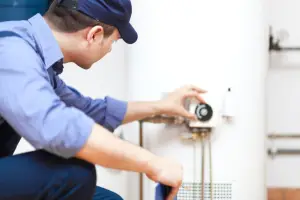All sorts of our daily needs are met with hot water. We wash our dishes, do our laundry, take hot showers, cook, and clean. Hot water heaters are a terrific convenience until the hot water becomes overheated and causes harm to you or damage to your home.
There are some signs that, if detected, may mean that your hot water heater is overheating. It is important to recognize when this may be happening, what may be causing the problem, and what you should do about it.
Signs that Your Water Heater May Be Overheating
There are various ways to tell if your water heating is overheating. Be aware of any of the following signs, and if you notice them, reach out to Plumbing by Jake before the problems become more severe. The quicker the problem is addressed, the less risk of further problems in the future.
Scalding Hot Water
This may seem like a no-brainer, but it is important to mention. The primary way most people notice their water heaters overheating is because the water becomes unbearably hot, scaldingly so.
If your water heater is set on too high a temperature, burns, and severe injuries may occur. It is important to check the temperature by using a thermometer to check the water temperature at the faucet.
Leaking Pressure Relief Valve
Hot water heaters have a safety feature known as a relief valve. The relief valve is there to prevent the water heater from exploding. If the relief valve is leaking, this may be causing your water heater to overheat.
Test your valve by lifting the lever for several seconds before releasing it. If the valve leaks even after lifting it, there is a good chance it needs replacing.
Listen for Strange Sounds
If your water heater is overheating, it may let you know by making strange noises. Listen for hissing, banging, and popping sounds. Often, these sounds are a result of sediment buildup. The sediment buildup can insulate the heating element and cause overheating.
Pay Attention to How Your Water Looks
Rusty water coming from your faucets can be a sign of water heater trouble. Overheating water heaters sometimes cause corrosion in the tank. This corrosion can cause leaks and other issues.
Energy Bill Increases
Paying attention to your energy bill may be a more subtle clue that your water heater is problematic. An overheating water heater runs more, causing increased energy costs. When an appliance is struggling to keep up, it naturally will consume more energy.
Your Water Heater Is Overheating. Here Is What You Need to Know
If you believe that your water heater is overheating, there are some things you must do:
- The first and most important thing you should do is turn off the power. If your water heater is electric, turn the switch off at the circuit breaker box, but if you have a gas water heater, turn off the valve that supplies gas.
- Ideally, a hot water heater will be set between 120° and 140° Fahrenheit. If you find that your water heater is set to a higher temperature, take this time to turn it down to the recommended range.
- The next thing you should consider if your water heater is still overheating is that the tank may need draining to remove sediment buildup. This must be done according to your manufacturer’s directions and may be better left to a professional.
- One of our qualified plumbing technicians can diagnose the problem with your water heater in no time. Then, if repairs are necessary, we can see to it that those are done promptly, or if the water heater needs to be replaced, we can see to that as well.
Preventing Overheating in the First Place
There are things you can do to prevent problems with water heaters overheating, to begin with. Some of the things we suggest are as follows:
- Make sure the thermostat on your water heater is set to the suggested temperature between 120°F and 140°F. This temperature will give you hot enough water to fulfill your needs without risking damage or burn injuries.
- Regularly check the water heater’s pressure relief valve. Lift it for a few seconds and then release it to make sure there are no leaks, and replace it promptly if there are.
- Have the tank drained as needed to remove sediment buildup that can lead to overheating.
- By insulating your tank, heat loss can be prevented, and the threat of overheating can be diminished. A good way to do this is to use an insulation blanket that is designated for water heaters and follow the manufacturer’s instructions when installing.
- Have a thermal expansion tank installed, which can prevent overheating because the water is allowed to expand when it is heated. An expansion tank reduces the water heater tank’s pressure and prevents the relief valve from opening without cause.
- Water heaters have a shelf life of about a decade. If your water heater is giving you problems and it is over ten years old, it may be time to replace it with a new, energy-efficient model.
Call Plumbing by Jake Today
If you notice signs of overheating like scalding water, a leaking pressure relief valve, unusual sounds, rusty water, and climbing energy bills, you need to take swift action to repair your water heater before it causes more problems. Water heaters can last you years with the right maintenance. The professionals at Plumbing by Jake understand the inconvenience of being without hot water and will ensure you are not without hot water for long.
If you have a water heater that is not behaving properly, call us. One of our experienced technicians can figure out the problem and have it corrected for you in no time. Whether you need your water heater repaired or replaced, we can do the job in a quick, efficient, and budget-friendly manner.

